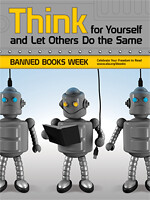William Gibson
Writers tend to accumulate a lot of stuff, short pieces that they wrote for this or that publication, or for no particular reason. After a while all that stuff can be swept together an become a book. This book is William Gibson's stuff.
Gibson is an odd, quirky kind of thinker, so his stuff is pretty interesting. The first piece "African Thumb Piano" is about how he set about learning to write fiction, science fiction, of course. He had a hard time at first with the cool technologies that were supposed to make his stories fit that genre. What do they do and what should he call them? "My wife parodied them all, not unkindly, as 'His long green ears quivering, Fino slipped from the rig.' Today this reminds me that I was having trouble with character names. At one point I seriously considered borrowing them from products in the IKEA catalog. But there was always something akin to 'the rig.' Some unimagined (by me), hence unnamed, element of technology." Later Gibson got very good at imagining and naming things, like "cyberspace," his invented term for an extension of the internet into a live space occupied by the minds of uber-hackers of the near future, who no longer had much interest in their physical bodies. Now we think of cyberspace as the world wide web.
In this book, Gibson reviews a record or two, visits Singapore (Disneyland with the Death Penalty), explains why he is fascinated with Japan, loves London and Tokyo, disparages the internet as a waste of time, becomes an eBay addict and visits the set of his own movie. It is a hodgepodge of "non fiction" writing by a master writer of fiction.
He predicts (12 years ago) that computer chips will indeed be implanted in peoples heads, for medical reasons and that they will rapidly become obsolete. I heard a piece on NPR just this weekend about a paraplegic, experimentally, controlling a robot arm through the use of a brain implanted chip. Twelve years from now we may see paraplegics walk again, using lab grown neurons implanted in their bodies to bypass the damaged spinal chord. Who needs a chip?
Some pieces have already been bypassed by events. Gibson includes a 1999 piece about digital film making: how it could someday be good enough to supplant real film. Hardly anybody makes movies on film anymore, it's too expensive and limited. The pace at which real technology now overtakes the imagination of science fiction writers is kind of scary.
I'm unsure which flavor I am instructed to distrust in the title of the book. Cappuccino Crunch?
Writers tend to accumulate a lot of stuff, short pieces that they wrote for this or that publication, or for no particular reason. After a while all that stuff can be swept together an become a book. This book is William Gibson's stuff.
Gibson is an odd, quirky kind of thinker, so his stuff is pretty interesting. The first piece "African Thumb Piano" is about how he set about learning to write fiction, science fiction, of course. He had a hard time at first with the cool technologies that were supposed to make his stories fit that genre. What do they do and what should he call them? "My wife parodied them all, not unkindly, as 'His long green ears quivering, Fino slipped from the rig.' Today this reminds me that I was having trouble with character names. At one point I seriously considered borrowing them from products in the IKEA catalog. But there was always something akin to 'the rig.' Some unimagined (by me), hence unnamed, element of technology." Later Gibson got very good at imagining and naming things, like "cyberspace," his invented term for an extension of the internet into a live space occupied by the minds of uber-hackers of the near future, who no longer had much interest in their physical bodies. Now we think of cyberspace as the world wide web.
In this book, Gibson reviews a record or two, visits Singapore (Disneyland with the Death Penalty), explains why he is fascinated with Japan, loves London and Tokyo, disparages the internet as a waste of time, becomes an eBay addict and visits the set of his own movie. It is a hodgepodge of "non fiction" writing by a master writer of fiction.
He predicts (12 years ago) that computer chips will indeed be implanted in peoples heads, for medical reasons and that they will rapidly become obsolete. I heard a piece on NPR just this weekend about a paraplegic, experimentally, controlling a robot arm through the use of a brain implanted chip. Twelve years from now we may see paraplegics walk again, using lab grown neurons implanted in their bodies to bypass the damaged spinal chord. Who needs a chip?
Some pieces have already been bypassed by events. Gibson includes a 1999 piece about digital film making: how it could someday be good enough to supplant real film. Hardly anybody makes movies on film anymore, it's too expensive and limited. The pace at which real technology now overtakes the imagination of science fiction writers is kind of scary.
I'm unsure which flavor I am instructed to distrust in the title of the book. Cappuccino Crunch?










0 comments:
Post a Comment
Comments will be moderated - so keep your comments moderate!
OpenID users will have their blog links again, yay!